Brian Murphy's Blog, page 5
April 26, 2025
The day Hannah met Sam Gamgee (and called to tell me)
 My Sam Gamgee is indeed a reflexion of the English
My Sam Gamgee is indeed a reflexion of the English soldier, of the privates and batmen I knew in the 1914
war, and recognized as so far superior to myself. --JRRTMy daughter Hannah saw Sam Gamgee in person this week. The coolest dude of The Lord of the Rings, the real hero of the story.
But that’s not the coolest part.
The coolest part was, she called to tell me. Breathlessly and right away. Because she knew I’d appreciate it more than anyone.
Walking through the campus of Endicott College this week Hannah saw that Sean Astin was due to speak to the students, that very night. A fortuitous find, if you happen to revere The Lord of the Rings and The Goonies as I do, and she does.
I showed her and her sister the films back in the day and we’ve watched them together a few times since. Hannah has gone on to introduce her friends to them.
It’s nice to know there is something of a mini-me out in the world.
It’s unnerving when your kids go out on their own, and take one step further from home than they’ve ever been (points for guessing the reference). When my phone rang at 4 p.m. and I saw it was Hannah, my heart raced a bit… it was an odd hour to call and I immediately thought something was wrong.
But it was very right.
“You’re never going to get what just happened!” she said. I was thrilled that she’d be seeing a star who brought us so much joy on screen… but even more happy that she thought to call me.
Hannah is like this. She’s naturally social, communicative, with a much better sense of this than I possess. Last year she started working as a teacher at Landmark, a school that specializes in children with high-functioning disabilities. A great fit, given her skillset.
She’s still close enough to come home and do her laundry and have dinner with her parents from time-to-time. But when she’s away she picks up the phone … and sometimes we talk about One Eyed Willy, Chunk, and “Baby Ruth.”
I’m thrilled she got to see the actor who played so many great characters we love, in person. But more than that, I’m happy she remembers her old man.
It’s a good reminder that I need to pick up the phone more often. I taught her some things … and she teaches me as well.
***
In other news of a biographical nature, I'm working my way through the new Robert E. Howard biography Robert E. Howard: The Life and Times of a Texas Author, by Will Oliver, and greatly enjoying that. My early impressions after about 200 pages: It is thorough, deeply researched, and walks a middle path between the likes of L. Sprague de Camp's Dark Valley Destiny and Mark Finn's Blood and Thunder.
I am also getting close to the end of my heavy metal memoir.
April 18, 2025
Cauldron Born: Born of the Cauldron
Blast their first album "Born of the Cauldon" this Metal Friday. Soak in the impeccable guitar tone and revel in that incredible album cover art by Lionel Baker II (you can view more of his artwork here, click on the album links).
April 17, 2025
Death gives meaning to life
Roy Batty is pissed. He is the peak of what a replicant can be. Brilliant and reflective. Handsome and powerful, a physical specimen.
But despite his near perfection—his is a light that burns twice as bright—he is, like the flesh and blood humans he is designed to replicate, mortal.
His maker, Dr. Eldon Tyrell of Tyrell Corporation, has programmed the replicants with a short lifespan. Roy wants more, telling his maker, “I want more life, fucker” (one cut of the film substitutes, “father,” which makes the point of who he is addressing even more blatant).
But more life is beyond Tyrell’s power. So Roy crushes his head like an egg.
His rage is understandable. We’ve all raged at the finitude of life. If you live long enough you see grandparents, aunts, parents, friends--hopefully not children—perish, and deal with grief of separation that may be eternal.
Roy’s life burns twice as bright, as does his incandescent rage at his maker. But is it possible he is mistaken, his anger misplaced? And that he should be, perhaps, grateful?
Roy’s death is beautiful. The speech he gives, reportedly ad-libbed, is perhaps the most powerful and poignant scene in the film. Ridley Scott made some interesting, purposeful choices with how he filmed it.
Death is necessary. Without it, life lacks meaning.
Ernest Becker in The Denial of Death explains that we are limited beings with unlimited horizons, and so live in a constant state of terror (often subliminal) about our own impermanence and insignificance. That all we do—witnessing attack ships off the shoulder of Orion, for example—will all be lost when we pass. And nothing will have come of it.
Yet a life without death represents a different kind of terror. In The Denial of Death Becker describes the concept of a transference object, which is a person, institution, or idea onto which an individual projects their need for meaning, security, and immortality.
My personal transference object is J.R.R. Tolkien. I happen to like very much what JRRT has to say about death. Tolkien writes that Iluvatar, the creator, gave Men the gift of mortality, setting them apart from the Elves, who are bound to the world until its end. Elves may be immortal, but they are also weary and burdened by time; their spirits are tied to the fate of Arda (the world), and they experience sorrow and loss without the release of death. Men, on the other hand, are granted the ability to leave the world—and their destiny beyond it remains a mystery, even to the wise.
This idea is most clearly articulated in The Silmarillion, where death is described not as a curse but as a “gift” that allows Men to transcend the world and return to Iluvatar in a way the Elves cannot. But as Morgoth corrupts the world, Men come to fear death, forgetting its intended grace. Instead the Numenoreans strive in vain for immortality.
Tolkien calls death a great gift, the greatest given to men. It breaks the cycle of worldly attachment and offers the hope of something greater. In Tolkien’s Catholic worldview, this aligns with the idea that death is a passage, not an end. It is the one thing that prevents stagnation, that pushes us toward humility, courage, and faith.
Death, for Tolkien, is the door through which true transcendence is possible. Interestingly, both Becker and Tolkien believed that human culture, politics, the stuff around us, was not the way to ultimate meaning. We must shift our perspective towards the cosmic. This mirrors my pursuit of identifying my values and searching for meaning in the symbolic world of ideas rather than the physical. We'll never find meaning here, not even in rings and Silmarils.
Death makes life meaningful, because without it spending time with people does not come with a cost. Without death, any achievement could be unlocked in time. Everyone would eventually share the same experiences, and memories, as they’d explore every crevice of the planet. Because you could in theory do everything, nothing would be unique, or special. Including any given human life.
You would never have to think about whether you want to spend your time reading a book, or watching a movie, because you could consume all of them. You could choose not to spend time with a loved one and instead watch 200 straight hours of Netflix, because you could spend as much time as you wanted, later. I am not sure love as we know it would even exist; we’d get bored with our life-mate and take up the next.
So death is a gift. It’s a mighty paradox, and I almost feel ashamed, flippant, at writing that. I am quite certain that when I lose someone dear, I will be devastated. I can’t even contemplate my own death, and potential eternal separation from everyone I love.
Yet on a relatively rational day like today I believe it to be true. The abstract knowledge of my own death motivates me to appreciate the warm spring sun coming through the window on my face. It motivates me to write this essay. “Blessed” with immortality and lacking any urgency, why not write it tomorrow, or tomorrow, or … never?
Part of me wonders if I’m not just rationalizing my own terror, the knowledge that I one day too will depart down The River of No Return.
Would I accept immortality were it offered to me, if some AGI were able to stop aging and keep us forever young? I don’t know.
But today, at least? I believe death is a gift.
Roy’s memories are not lost like tears in rain because his story remains. Deckard is the witness, and we are the witness of the film. His death and all deaths are tragic of course, but it’s also the ultimate gift for humanity, which makes more Roy never more human than at that very moment.
And perhaps his soul, symbolized by the flight of the dove, is saved.
***
Holy crap I’m writing about some heavy topics these days. I seem to have no choice, just following the muse. I suppose this is what happens when you’re north of 50 and an empty nester, dealing with a death in the family and others suffering with old age. But the spring is here and I’ve got a lot to be grateful for.
April 11, 2025
The Knight stands against nihilism
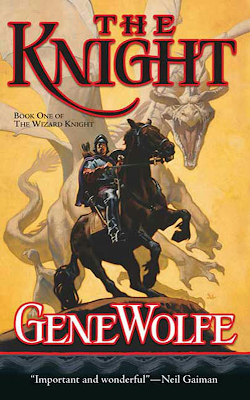 Excellent book... unfortunate cover blurb.
Excellent book... unfortunate cover blurb.
“It is honor, Able. A knight is a man who lives honorably and dies honorably, because he cares more for his honor than for his life. If his honor requires him to fight, he fights. He doesn’t count his foes or measure their strength, because those things don’t matter. They don’t affect his decision.”
The trees and the wind were so still then that I felt like the whole world was listening to him.
“In the same way, he acts honorably toward others, even when they do not act honorably toward him. His word is good, no matter to whom he gives it.”
--Gene Wolfe, The Knight
Character matters. There is truth in the world of ideas.
I was listening to a podcast the other day. One of the guests--an author, self-described philosopher, and entrepreneur—concluded a view of the world I find abhorrent: Objective truth does not exist, values are manufactured and none better than others, and the purpose of life is maximizing personal happiness.
I’m leaving this dude’s name out because I don’t know him, and I’m attacking the idea, not the individual. But I do wonder: How do you end up in your mid-50s endorsing nihilism? Cheerily admitting there are no such things as absolute moral values … which means that everything is in theory permitted? It’s a train of thought that leaves dragons hoarding wealth they’ve ruthlessly abstracted from others, swelled with hubris, unable to see that their gold is derived from the thankless labor of uncountable generations who built civilization, created the human project from squalor, and allow for the existence of privileged coastal millionaire elites.
Few openly admit to nihilism, but many act that way. “I’ll extract wealth from the less fortunate, because no one is watching. And after all, it’s technically legal and I can get away with it.”
We each have the freedom to construct our own meaning and live our own lives as we see fit … except when that freedom infringes on or destroys other’s lives. The strong are obligated to lift up the sick, weak, and needy. Because it’s honorable to do so. And I would argue, an obligation that is an objective truth of the human condition. How long does this last if everyone behaves like a selfish douche canoe?
Imagine if Able of the High Heart was a nihilist? It would make a much different book than Gene Wolfe’s The Knight.
The story centers around a small boy who enters through a portal from our world to Mythgarthr, a world of high fantasy, gods, magic, monsters… and stouthearted knights. After an encounter with an elflike being, Disiri the Mossmaiden, Able rapidly grows into a powerful man and embarks on a journey into knighthood.
This sudden transformation means we get a uniquely compressed character arc. Able goes from an adolescent experiencing the vicissitudes of life, to young man called to perform duties to others, to grown man called to service to his own heart and conscience. From learning from others to teaching others the way. As we all should, objectively. Because if we don’t do this, we’ll leave the next generation in shambles. Which should concern you unless you’re a nihilist and think that death and life are one and the same.
Of course, we’re never going to be perfect. We throw away much for pleasure. Reject responsibility to others because it doesn’t maximize our momentary well-being. As Able does with the vixen of the woods. This is part of growing up. I think we all have to indulge in pleasures of the flesh.
But at some point adults realize it’s time to fight the dragon.
As noted recently I struggle with Wolfe. I find him needlessly opaque and allusive, at times impenetrable. Not so much with The Knight, which I enjoyed, if not unreservedly. Even here Wolfe does not make the journey easy for the reader. The story is told in an epistolary/letters from Mythgarthr to modern earth style which I don’t love, which leaves important sequences glossed over or relegated to the background. Able often for example will completely gloss over a battle, and only later do we realize the extent of his heroism through offhand remarks from observers after the fact.
… but that’s sort of the point, isn’t it? Knights with a code of honor don’t crow about their accomplishments. They don’t virtue signal on Instagram and sell self-help books as they lead deeply insulated, selfish lives. That would be … dishonorable.
There’s much other great stuff in here that make the The Knight a memorable journey. Wolfe-ian symbols I’m quite certain I failed to grasp. When Able plunges three times into a deep pool, beyond air and endurance, to retrieve his armor and sword, and hears the horns of Aelfrice/elfland, we feel a mythic power we cannot articulate, literally and metaphorically deep. But one lesson we can be sure of: Unless you confront the metaphorical dragon it becomes terribly real.
I’m sure I will tackle The Wizard after a palate cleanser. For now something a bit lighter is in order.
April 6, 2025
My daughter has a Substack. Which is very cool.
In September 2007 my oldest daughter, Hannah, was only five years old, and just starting kindergarten.
We've come a long way baby. The MCU grew to massive proportions then deflated in a super hero sized bout of fatigue. YouTube and TikTok are our inherited legacy, and blogs like this have gone the way of DVDs and vinyl--the refuge of die-hard holdouts. Fortunately we've still got spaces for blogging and other long-form writing. Updated platforms like Substack.
Hannah is now 23 and has a Substack of her own.
I suspect my average reader will not be hip to her essays (though if you happen to have 18-25 year-old children who are thoughtful about culture, movies, and music, have them take a look). Hannah and I are very different, with different cultural touchstones, entertainment tastes, and life experiences, but we also have many things in common. We're both avid readers, we love The Lord of the Rings films, and most notably we share a passion for language and for writing.
And now, we each have our own little bit of cyberspace where we share our writings with the world.
I post this here not to direct traffic her way, just to say that I'm incredibly proud of Hannah and wish her the best in her new endeavor. I've read her handful of essays as well as other work she completed for school, and she's really good--better than I was at her age, when I was still doing my best impression of Animal House's Flounder (fat, drunk, and stupid is no way to go through life son, though I was giving it a go).
Every dad wants their kid to be successful, and she's become a fine young woman, an excellent first year teacher, and now, a fledgling blogger. May she not have to endure the same typos, gaffes, and occasional trollish comments her Dad has suffered. I expect she will, but that's the writing life, and the wages of fame and glory.
Good luck kid.
March 29, 2025
Gene Wolfe is intimidating. The Knight is not. I also recommend smoked brisket.
I’ve got a Gene Wolfe sized hole in my reading.
Wolfe is generally accorded of the most respected and literary fantasy authors--ever. Readers are enthralled by his fierce intelligence, incredible imagination, vivid world building and 3D characters. But even his most ardent fans acknowledge he can be tough, reading his stories not unlike grappling with water or a Brazilian Jiu Jitsu master. Half of the reviews of The Book of the New Sun are people who don’t seem to understand what’s going on yet declare that “you have to read this.”
Weird.
As for me, I read the first Book of the New Sun, The Shadow of the Torturer, some 10-12 years ago. Read is perhaps generous; I muddled through, and after closing the cover was left puzzled—not defeated, but feeling like I didn’t grasp it all and probably needed a second attempt. I’ve enjoyed a few of Wolfe’s short stories and deflected off few others; “The Sailor Who Sailed After the Sun” in Grails: Quests of the Dawn left me scratching my head and disappointed, but “A Cabin on the Coast” from the Year’s Best Fantasy 11 was terrific. I also liked “Bloodsport (not the one with Jan Claude van Damme) in Swords and Dark Magic well enough.
The best thing I’ve read by Wolfe is his essay “The Best Introduction to the Mountains,” a moving and poetic elegy to JRR Tolkien that you can read online in its entirety. Wolfe blends a poem by Robert E. Howard into the piece, S&S fans. Writes Wolfe of Tolkien’s greatest literary legacy, “Freedom, love of neighbour, and personal responsibility are steep slopes; he could not climb them for us—we must do that ourselves. But he has shown us the road and the reward.”
Check it out.
But as for his fiction… I’m decidedly mixed. Wolfe loves unreliable narrators and I’m generally not a fan of this device which perhaps explains my ambivalence. But I haven’t given up on Gene, and so decided to have another go with what others have described as his most accessible work—his The Knight and The Wizard, two novels often published together.
I’ve begun reading The Knight. And am happy to report, it’s fantastic. Teenage boy is transported into a magical realm and an encounter with a lusty sprite transforms him into powerful man, and a knight, Sir Able of the High Heart. It’s a straightforward narrative… yet there are clear Wolfe-ian undertones of, a lot more going on under the surface than our narrator understands.
I’m not quite halfway through and will have a review up here on the blog later.
***
In other happy news Spring has finally arrived in New England. I broke out the smoker yesterday and made a brisket that was decidedly on-point. And enjoyed it with my father. No sides necessary, other than beer. I'm getting better with the smoker, which really comes down to low and slow. All good things take time to make.

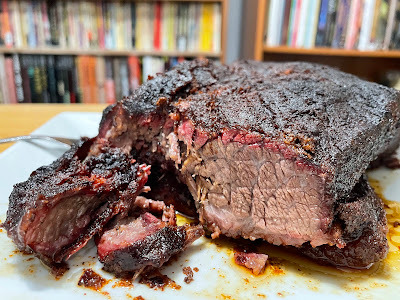
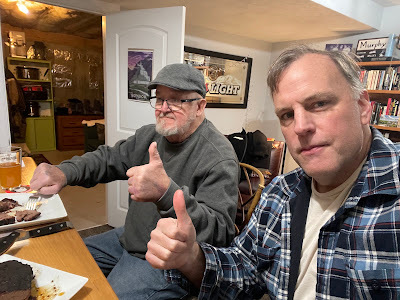 So, on this great journey into the East, straight meat was the bill of fare, ammunition and tools principally made up the load on the sled, and the time-card was drawn upon the limitless future. -- Jack London
So, on this great journey into the East, straight meat was the bill of fare, ammunition and tools principally made up the load on the sled, and the time-card was drawn upon the limitless future. -- Jack LondonMarch 25, 2025
Facebook ripped me off
I punched my name into this handy plagiarism detection tool published by The Atlantic, and like millions of other authors discovered Mark Zuckerberg ripped me off. The nerve of this douche!
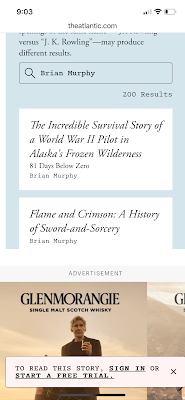 There I am! Above the whiskey. Of which I now need a few shots.
There I am! Above the whiskey. Of which I now need a few shots.In case you missed the recent news, “Meta and its founder and CEO Mark Zuckerberg deliberately and explicitly authorized a raid on LibGen—and Anna's Archive, another massive digital pirate haven—to train its latest AI model.” Millions of books have been ingested into Llama 3 without author compensation, or even notification.
What makes it even worse is that the fine folks at Facebook (I almost wrote that without a sneer) could have put some thought into the decision. Taken a few extra weeks to do the right thing. But instead chose to behave like Somali pirates operating on the open ocean.
What the fuck, Zuck.
There is of course complexity to this. How does fair use apply to the output of generative AI? Is feeding a machine training data the equivalent of a person reading? Will slowing AI development with more rigorous author protections and safety guardrails put us behind foreign competitors like China?
But that’s a battle for someone else to fight. Me? I’m tired of the techo-obfuscation and the excuse-making. This is pretty close to outright theft. Facebook could have done this the legal and proper way but its leadership team chose to operate like immoral assholes. Which should surprise no one.
I've written before that I'm not a fan of generative AI, even though I believe it has incredible potential and is here to stay. It’s just beyond galling that big companies like Meta and OpenAI scrape data from wherever and whomever they want and then sell it back to you in the form of subscription products. And then rigorously defend their own gated fiefdoms with impenetrable legalese and teams of lawyers.
The moral of the story: Laws don’t apply to big companies like they do individuals.
Honestly I am not THAT pissed. Just looking on, feeling bemused, disappointed and disempowered, sort of like the victim of a drive-by egging. Perhaps Llama 3 will now create some kick ass S&S haikus using the genre elements I outline in Flame and Crimson. Maybe there will be a class action suit and I will be entitled to a $3.87 payout after the lawyers take their share. We’ll see.
March 21, 2025
The Rage, Judas Priest
It's a testament to the greatness of British Steel that a song as good as "The Rage" is buried deep on side 2. Wait, do people still refer to albums, and sides? I do.
There is a reason this album is a stone-cold classic. To use a sports analogy its bench is deep ... I don't think it has one weak track and it all sounds awesome, songs stripped down to bare steel. You will find an album "none more metal," to paraphrase one Nigel Tufnel.
The start of "The Rage" is quite unexpected, a funky solo bass intro followed by a jazzy, swinging drum beat that lulls you in to a false sense of security. Where's the rage?
But wait, it's coming. An angry, fist-thrusting metal assault, pounding beat and heavy guitar backed by Rob Halford's soaring vocals.
The breakdown at the end with the rapid fire (snare? I'm not a musician) is divine. It sounds like a machine gun. See 4:06 of the below video.
Maybe it is. Happy Metal Friday.
When we talk with other men
We see red and then
Deep inside our blood begins to boil
Like a tiger
In the cage
We begin to shake with rage
March 20, 2025
The Ring of the Nibelung/Roy Thomas and Gil Kane
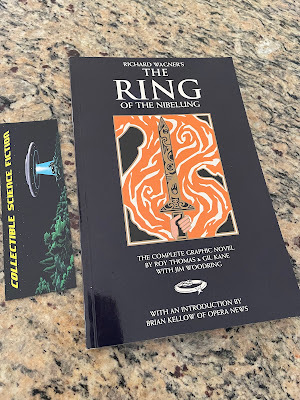 The Ring is mine!Over the course of my lifetime I’ve been exposed to Richard Wagner’s The Ring of the Nibelung in many and various ways. The story, or pieces thereof, from the Old Norse literature upon which the operas are based. The thematic content from modern works like The Broken Sword and The Lord of the Rings. Even the music, which I’ve heard in various and sundry films including Apocalypse Now ("The Ride of the Valkyries") and Excalibur (“Siegfried’s Funeral March” and “O Fortuna,” among others).
The Ring is mine!Over the course of my lifetime I’ve been exposed to Richard Wagner’s The Ring of the Nibelung in many and various ways. The story, or pieces thereof, from the Old Norse literature upon which the operas are based. The thematic content from modern works like The Broken Sword and The Lord of the Rings. Even the music, which I’ve heard in various and sundry films including Apocalypse Now ("The Ride of the Valkyries") and Excalibur (“Siegfried’s Funeral March” and “O Fortuna,” among others).But I haven’t ever seen the opera nor read a full literary treatment of the work. And was overdue to scratch this niggling itch … but wanted to have some fun, with a low bar to entry. And so, I scooped up a treatment I did not know existed until quite recently: Richard Wagner’s The Ring of the Nibelung, the complete graphic novel as adapted by the great Roy Thomas and Gil Kane, with Jim Woodring.
This was enjoyable. I plowed through it in just a few hours over a few nights. It’s a product of DC Comics, released in 1991, and checks in at a relatively hefty 191 pages. It includes some welcome introductory material, including a foreword introducing the biography and talents of the authors, and an introduction to Wagner’s opera cycle by Brian Kellow of Opera News.
The Ring of the Nibelung is a somewhat complex story, with four acts/operas (Wagner prefers music dramas) spanning long periods of time, told through different sets of characters ranging from gods, giants, and dwarves to the heroic albeit mortal race of humans known as Nibelungs. It starts with the creation of the world, and ends with its downfall at Ragnarok. The centerpiece is the story of Siegfried, a mortal hero sent to slay a dragon, reclaim the gods' stolen gold and rescue the Valkyrie Brunnhilde. These stories are bound together by a golden ring that grants its wearer dominion over the world. Yes, there are some Tolkien parallels here, which JRRT denies and to be fair he likely drew on Wagner’s common influences, not the operas. But we’ve got a greedy dragon hoarding wealth, a precious ring fought over by two brothers (one of whom kills the other to take it for himself), a broken sword reforged, and many other familiar elements.
Overall it's a gorgeous, epic, deeply thematic story well told by Thomas—and as you’d expect from his pen, it moves. Kane’s artwork is marvelous, beautiful, comic booky and muscular but not garish. The men are jacked and the women beautiful. Rather than me attempt to word-paint here are some of the panels:
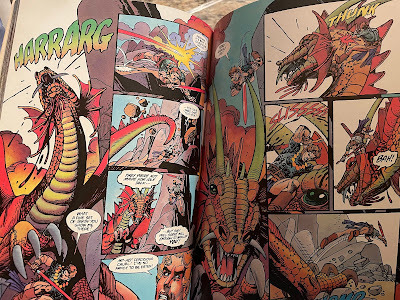
What does it all mean? There’s a lot to dig into, too much for me after one rapid reading of an adaptation in graphic novel form. But The Ring is undoubtedly a Great Story, and like all great stories contains truth. I’m quite fond of Sir Roger Scruton’s “Reflections on The Ring of the Nibelung,” which he describes as a story for “modern people, for whom the path to heroism is overgrown.”
From that essay:
Wagner’s story of gods and heroes, of giants and dwarfs, is not a fairy tale. It is addressed to modern people, who have lost the ways of enchantment, and for whom the path to heroism is overgrown. It is a story in which law and love, power and property are all caught up in a life and death struggle between the forces that govern the human soul.
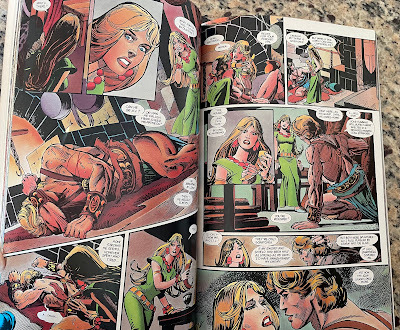
Love without power will not endure, and power without law will always erode the claims of love. We live this paradox, and without the gods to maintain the moral order the burden of it falls entirely on our shoulders.
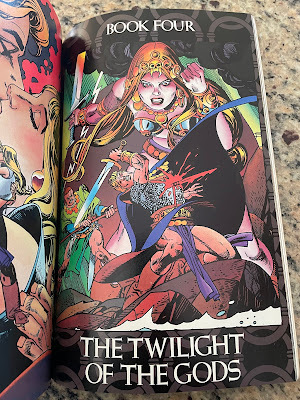
Gods come and go; but they last as long as we make room for them, and we make room for them through sacrifice. The gods come about because we idealize our passions, and it is by accepting the need for sacrifice on behalf of another that our lives acquire a meaning. Seeing things that way we recognize that we are not condemned to mortality but consecrated to it. Such, in the end, was Wagner’s message. Yes, the gods must die, and we ourselves must assume their burdens. But we inherit their aspirations too: freedom, personality, love, and law. There is no way in which we can achieve those great goods through politics, which, if we put too much faith in it, will inevitably degenerate into the kind of totalitarian power enjoyed by the dwarf Alberich. But we can create these things in ourselves, and we do this when we recognize the sacred character of our joys and sufferings, and resolve to be true to them.
For more reading and listening, check these out:
Reflections on “The Ring of the Nibelung”
Wagner Götterdämmerung - Siegfried's death and Funeral march Klaus Tennstedt London Philharmonic
March 15, 2025
The Empress of Dreams—an (overdue) appreciation of Tanith Lee
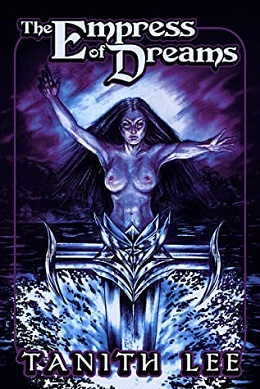 I don’t write fiction, but I’ve read enough of it to make some observations about what makes for good writing. Here’s one: Good writing results from knowing what to emphasize, and what to leave out.
I don’t write fiction, but I’ve read enough of it to make some observations about what makes for good writing. Here’s one: Good writing results from knowing what to emphasize, and what to leave out. Poor writing is usually not the result of a bad idea, nor even of clumsy or artless style. Rather it suffers from being bogged down in needless detail, not placing proper emphasis on the right things. Good storytellers know where to aim the lens. When to let it linger, and when to move it along. Then comes inventive plot, believable character, and good word choice and style. In no particular order.
Tanith Lee is such a storyteller. She’s a writer of atmosphere and romance and decadence and depth who accomplishes this with an economy of words that astonishes. She seems to have an unfailing instinct for what is boring (what to leave out), what keeps the story moving (what to emphasize). Lee then harnesses these principles to a wonderful and unique style that makes every word a pleasure, the act of reading immersive. Dense yet somehow elegant, evocative, lush, and dreamlike. A master of the craft.
The result is that a short story collection like The Empress of Dreams moves, and contains multitudes.
This 2021 collection from DMR Books includes16 stories written over the course of Lee’s career, the earliest from 1976 (“The Demoness,” originally published in The Year’s Best Fantasy Stories 2), and the latest 2013, just two years before her death (“A Tower of Arkrondurl,” originally published in Legends: Stories in Honor of David Gemmell). All can be grouped loosely as sword-and-sorcery. There are some who seem to want beefcake heroes and epic battles and slaughter out of S&S. You don’t get that here. What you do get is dark magic. Atmosphere. The true weird, displacement and strangeness in quasi-medieval settings that derived from Lord Dunsany and Clark Ashton Smith and continued through to Jack Vance and Michael Shea. For modern comparisons, look to the likes of Schuyler Hernstrom or John Fultz.
Some of these stories are S&S through and through. Mercenaries in search of gold, a hot meal, or a new start in life. Warriors encountering strange towers. Everything is small stakes (well, if you count your life as small stakes). But there’s also deep symbolism, engagement with themes and the human condition. “The Woman in Scarlet” explores the fickleness and disloyalty of women in a frank albeit oblique way—it’s told from the vantagepoint of a female sword--that I think a man would have trouble writing. Fearless, edgy stuff. “Odds Against the Gods” is about a young woman in search of her past, and her identity. Lee writes strong men and women in her stories, lusty and brave and three dimensional. Four pages into this collection a woman is enjoying the pleasures of another woman, and later on the attentions of a man. If this type of thing offends you, sorry? Look elsewhere.
I haven’t even mentioned her imagination which at times seems unshackled from the earth. In “The Pain of Glass” Lee conjures a story about a goblet spun from a patch of desert on which a dying woman is separated forever from her true love. Part of her ethereal voice and spirit is absorbed into the sand and later heated and molded into a glass that seeks its soulmate, traveling from hand to hand over years. Those who drink from it are changed:
“Is the cup ensorcelled?”But again, what unites all of these disparate stories is terrific writing. Here’s how Lee renders the changing face of an arrogant town guardsman, whose veneer of invulnerability crumbles beneath the insult of an insouciant outsider who refuses to be intimidated:
“I cannot definitely tell you,” Jandur answered. It was a fact, he could not.
“It is—what is it?”
“Alas, I cannot say. Mystical and magical certainly.”
“Does it affect all—who—touch it?”
“In various ways, it does. Some weep. Some blush. Some begin to sing.”
“And you,” said Razved, with another warning note suddenly entering his voice; that of jealousy, “what do you feel when you take hold of it?
“Fear,” Jandur replied simply.
“Ah,” said Razved. “It is not meant for you, then.”
Razibond’s face was now a marvellous study for any student of the human mood. It has passed through the blank pink of shock to the crimson of wrath, sunk a second in superstitious, uneasy yellow, before escalating into an extraordinary puce—a hue that would have assured any dye-maker a fortune, had he been able to reproduce it. More than this, Rozibund had swollen up like a toad. He cast his wine cup to the ground, where it shattered, being unwisely made of clay, and, disdaining his knife, heaved out a cleaverish blade some four feet long.Wonderful.
Admission—I had read Lee prior in the likes of Swords Against Darkness, The Year’s Best Fantasy Stories, and Amazons, which I re-read while researching and writing Flame and Crimson. But I’ve never any of her many novels, of which she’s written more than 90(!), nor a collection. This was a mistake. I think she is close to a first rank S&S writer. She’s that good. In fact she might now rank as my favorite female S&S writer. I feel that strongly after reading this collection. C.L. Moore’s best short stories (Black God’s Kiss, Shambleau, Hellsgarde) and Leigh Brackett’s The Sword of Rhiannon are as good or arguably better as anything in here but The Empress of Dreams as a whole is in incredibly diverse and strong all the way through, hit after hit or at least strength to strength.
Lee’s literary debt to Vance is evident and admittedly her greatest influence, and so it is appropriate that the collection ends with “Evillo the Uncunning,” which originally appeared in Songs of The Dying Earth: Stories in Honor of Jack Vance (2009). This story ends with Lee’s short appreciation of Vance, in which she writes, “I don’t quite believe Jack Vance invented the Dying Earth. Part of me knows he’s been there. Often.”
Lee seems to be having a bit of a resurgence these days due to the Neil Gaiman controversy, which has brought to light Gaiman’s liberal borrowing from Lee’s flat earth stories. No one would have a problem with this had Gaiman admitted as much; Lee certainly admits to her own great indebtedness to Vance, for example. The fact he has seemingly never admitted to Lee’s influence does him no honor. See more here.
What criticisms do I have of this collection, if any? Lee loves open-ended endings perhaps a little too much. Not all her stories do this, but enough fall into the category of leave it up to the reader to figure out the meaning. I’m of a mixed mind of these types of stories; it can rob them of impact, leaving you with the feeling you’ve read something unfinished, scratching your head. But these are also the sort of stories that stay with you; you are made to put the pieces together and assemble the meaning, and when you do, you participate in the story. And it lingers. As this collection does.



